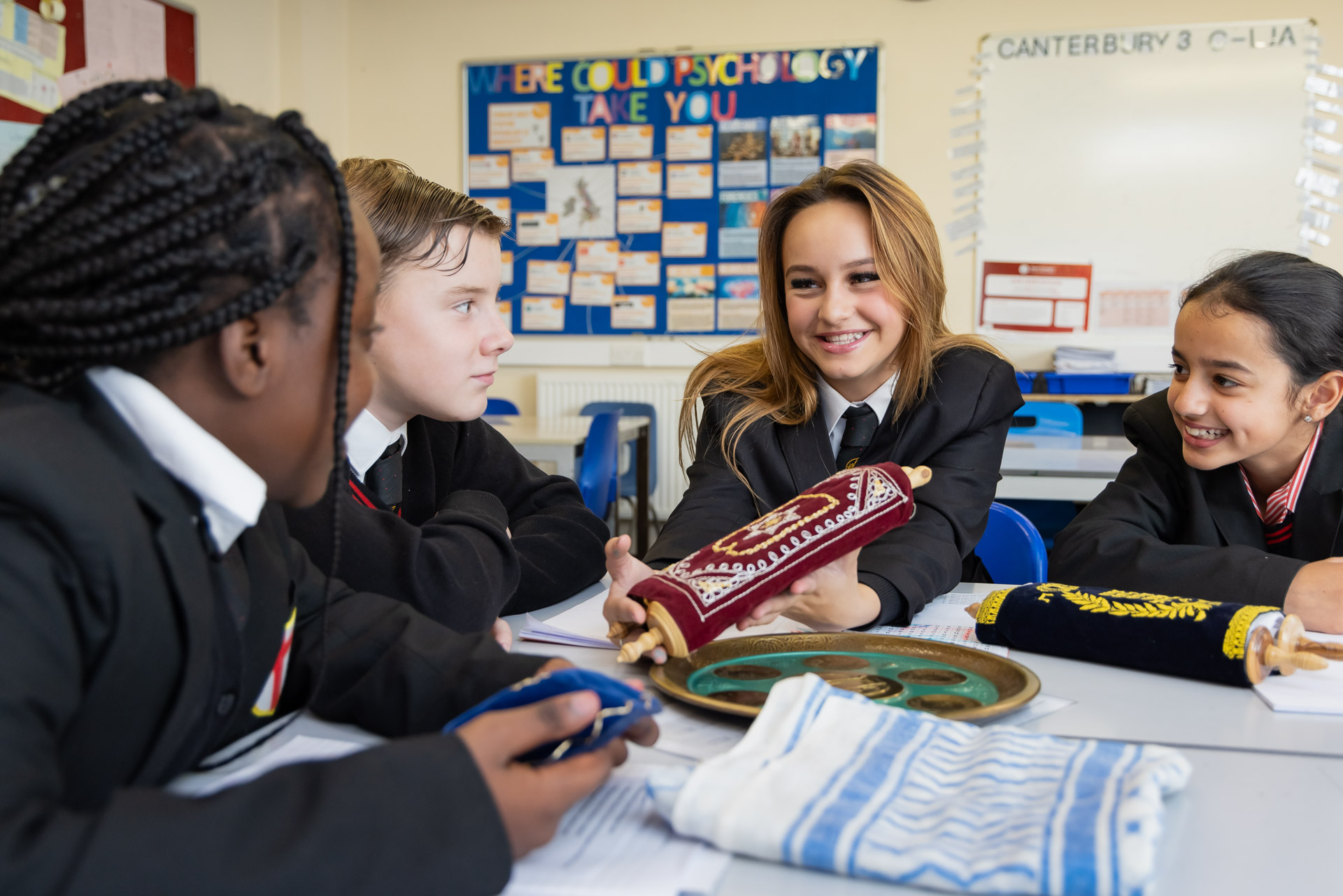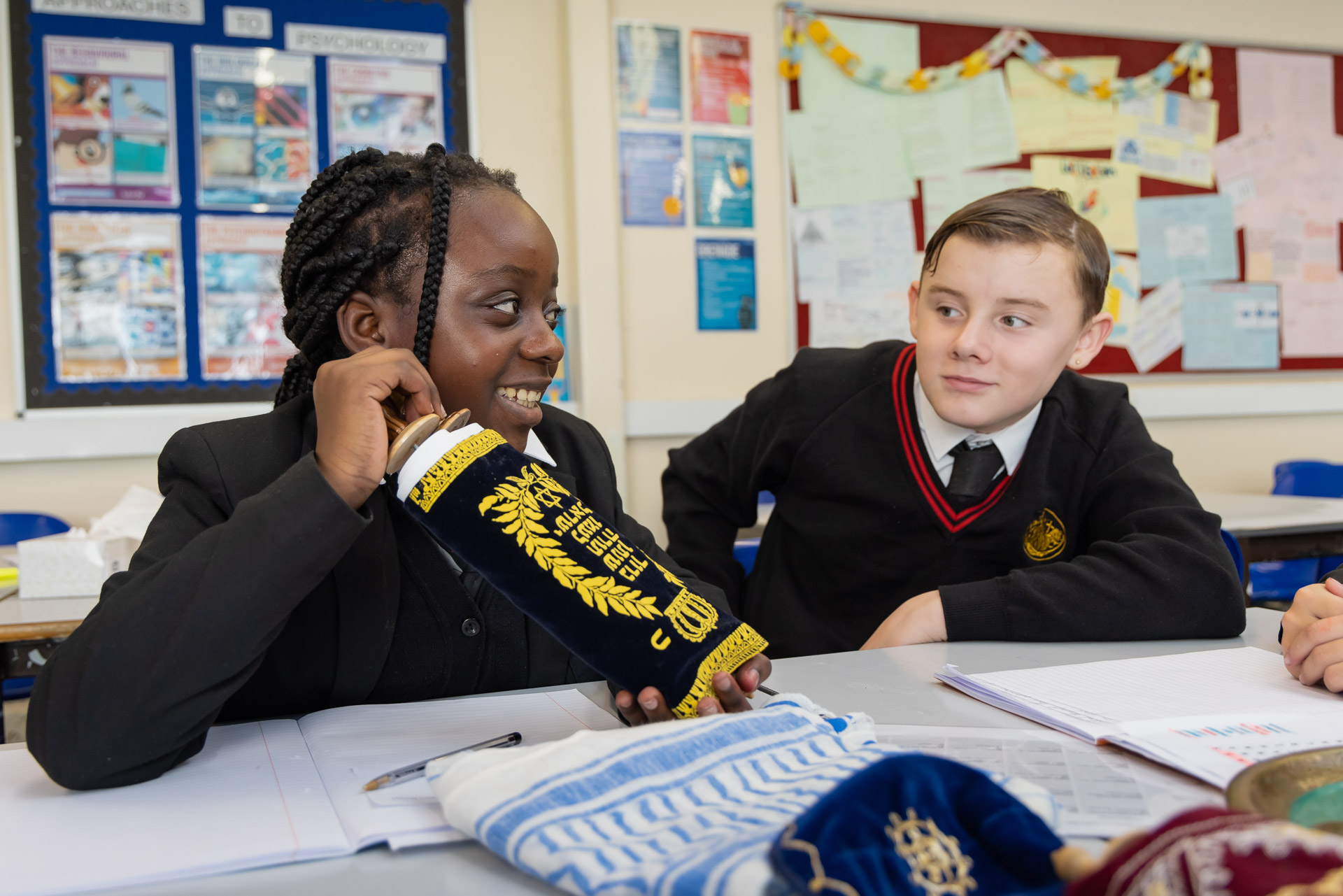Religious Education
Curriculum Leader: Mrs S Neighbour - neighbours@saintgeorgescofe.kent.sch.uk
Education is the most powerful weapon which you can use to change the world
nelson mandela - former president of south africa
Although Religious Studies is not about being religious, it is about establishing yourself as a person, it's about knowing that you think, and being aware of what others think”.
As a Church School, we value Religious Education and therefore all pupils will receive a full GCSE in Religious Studies. Religious Studies is, therefore, a core subject at Saint George’s School, and all students will follow the GCSE Edexcel Religious Studies B course. We have already started this in Year 9 and will continue to teach the course through to Year 11.
View our Learning Journey for RE here
Intent
Our curriculum is designed to allow students to diversify their beliefs. We cover topics that suit our whole school community, ranging from the study of religions to thematic topics to which both religious and non-religious viewpoints are applied. RE at Saint Georges is designed to support students with their self-expression, and we work hard to ensure that RE is a safe space for all learners to explore topics they may not have had the opportunity to before.
As all students will sit the full GCSE in year 11, it has allowed us to develop a broad and balanced curriculum in KS3 that builds on knowledge and skills in KS4 and KS5. Our curriculum is constantly evolving to allow students to stay updated with relevant topics and issues worldwide.

Implementation

RE lessons cover up-to-date and relevant information to support learners with their beliefs. Teachers are proactive in ensuring that students can discuss and understand different beliefs and viewpoints and that spiritual development is supported by all in the classroom. Topics taught in KS3 and KS4 focus on knowledge and skills, particularly the development of opinions and evaluation. We ensure that SEND and disadvantaged children are given the necessary support in class to access the Curriculum fully and that equal opportunities are given to all.
Impact
RE at Saint George’s helps students empathise with others and allows learners to formulate their own opinions on our topics. Assessment practices at Saint George’s aim to ensure students have a breadth of knowledge, focusing on both religious and non-religious views. Additionally, it builds students’ knowledge of how to evaluate and analyse as well as develop skills in literacy.

Religious Education in Key Stage 3 (KS3)
Per fortnight: 3 Lessons
As students progress there is a greater emphasis on:
| Year 7 | Year 8 | Year 9 | |
|---|---|---|---|
| Term 1 | Judaism - Prophets in Judaism (Abraham and Moses), The Torah and the 10 Commandments, Jewish worship –(Shabbat and worship in the Synagogue), Jewish Food Laws, Bat and Bar Mitzvahs and the Jewish festival of Passover. | Islam - Islam in the UK, Sunni/Shi’a split, The belief in Tawhid, 5 Pillars of Islam, Shahadah (Declaration of Faith), Salah (Prayer), Zakah (Charity), Sawm (Fasting), Hajj (Pilgrimage) and Muslim festivals of Id-ul-Fitr and Id-ul-Adha. | Christianity and Atheism - What is Atheism?, Different ethical theories (Situation Ethics and Utilitarianism), Civil Rights Movement, Martin Luther King Jnr and his importance, Impact of Martin Luther King Jnr today and Applying ethical theories to Martin Luther King Jnr’s work. |
| Term 2 | (same as term 1) | (same as term 1) | Christian Beliefs - The nature of God, The Trinity, Christian beliefs about the creation of the world, Stewardship and its importance, The Incarnation, The last days of Jesus’ life (Crucifixion, Resurrection and Ascension), Salvation and Atonement, Christian beliefs about life after death, The problem of evil and suffering and Christian responses to evil and suffering. |
| Term 3 | Christianity - The Trinity, The Incarnation and the Christian festival of Christmas, Jesus’ Baptism, Jesus being tempted in the desert, Jesus’ Crucifixion and Salvation, Jesus’ Resurrection, Jesus’ Ascension and the Christian festival of Pentecost. | Buddhism - The life of the Buddha, Siddhartha Gautama and the Four Sights, The Four Noble Truths, The Eightfold Path, Buddhist beliefs about rebirth and Karma, Buddhist worship and Buddhist festival of Wesak. | (Same as term 2) |
| Term 4 | (Same as term 3) | Sikhism - Guru Nanak and his importance in Sikhism, The 10 Gurus, The Khalsa and the 5 K’s, Sikh worship, Sikh festival of Vaisakhi and Sikhism in Gravesend. | Christian Practises - Nature of worship in Christianity (types of worship), Nature of worship in Christianity (the Church), 7 Sacraments, Baptism as a Sacrament, Eucharist as a Sacrament, Christian pilgrimage sites, Christian festival of Christmas, Christian festival of Easter, Service in the local community and Evangelism and Christian Missionary work. |
| Term 5 | Christianity - Jesus’ ‘I Am’ sayings, Jesus raising Lazarus from the dead (‘I am the Resurrection and the Life’), Jesus healing the blind man –(‘I am the light of the world’), Jesus feeding the 5000, ‘I am the Bread of Life’, Parable of the Good Samaritan (‘love thy neighbour’) and Parable of the Sheep and the Goats. | Multicultural Society - Human Rights, The value of human life in the 6 major world religions, Multiculturalism, Immigration and migration, Faith communities, Religious clothing and dress and Religious festivals around the world. | (Same as term 4) |
| Term 6 | (Same as term 5) | (Same as term 5) | Marriage and Family - Christian beliefs about marriage, Cohabitation and Non-Religious beliefs about marriage, Christian beliefs about sex outside of marriage, Christian and Non-Religious beliefs about Same-Sex relationships, Christian beliefs about family planning and the use of contraception, Christian beliefs about divorce, Family types, Christian beliefs about the family unit and Local Parish support for the family. |
Religious Education in Key Stage 4 (KS4)
Per Fortnight: 5 Lessons
| Year 10 | Year 11 | |
|---|---|---|
| Term 1 | Marriage and Family and Matters of Life and Death - Prejudice and Discrimination, Equality of men and women in the family, Gender Prejudice and Discrimination, Origins of the Universe (Big Bang), Christian beliefs about Evolution, Issues surrounding the natural world, Christian beliefs about animal rights, Sanctity of Life and its importance to Christians, Pro-life and pro-choice arguments around Abortion, Christian beliefs about Abortion, Ethical challenges raised around Euthanasia, Christian beliefs about Euthanasia and Christian and Non-Religious arguments for the existence of life after death. | Crime and Punishment and Peace and Conflict - Muslim beliefs about forgiveness, Muslim beliefs about the treatment of criminals, Muslim beliefs about Capital Punishment, Peace and Muslim beliefs about peace, Muslim charities and peace-making, Conflict and factors that cause it, Israel-Palestine conflict, Muslim responses to conflict, Pacifism and Muslims beliefs about it, Just War Theory and Muslims conditions for it, Holy War and Muslim conditions for it, Weapons of Mass Destruction, Issues surrounding conflict and How do Muslims respond to problems around conflict? |
| Term 2 | Muslim Beliefs - Islam in the UK, The life of the Prophet Muhammad (PBUH), Sunni/Shi’a split and how it impacts Muslims today, 6 Beliefs of Sunni Islam, 5 Roots of ‘Usul ad-Din in Shi’a Islam, Tawhid and its importance to Muslims, Muslim beliefs about the nature of Allah, Muslim beliefs about Angels, Muslim beliefs about Prophets, Muslim beliefs about holy books, Muslim beliefs about life after death and Muslim beliefs about predestination. | (same as term 1) |
| Term 3 | (same as term 2) | Revision |
| Term 4 | Muslim Practises - 10 Obligatory Acts in Shi’a Islam, 5 Pillars of Islam, Shahadah and Tawhid, Salah and the importance of the Jummah prayer, Zakah and Khums for Shi’a Muslims, Sawm and the Night of Power, Hajj and its importance, Greater and Lesser Jihad and Muslim festivals of Id-ul-Fitr, Id-ul-Adha, Ashura and Id-ul-Ghadeer. | Revision |
| Term 5 | (same as term 4) | Revision |
| Term 6 | Crime and Punishment - Crime and punishment in the UK, Muslim beliefs about justice, The causes of crime, Muslim beliefs about crime, Good, evil, and suffering, Aims of punishment and Muslim beliefs about punishment. | Revision |
GCSE Assessments
This course is a 100% examination.
| Paper 1: Area of Study 1 – Religion and Ethics (50%) | Paper 2: Area of Study 2 – Religion, Peace and Conflict (50%) |
|---|---|
|
Written Examination. 1 Hour 45 minutes. 102 Marks. |
Written Examination. 1 Hour 45 minutes. 102 Marks. |
|
Students must study all four content sections based on Christianity.
|
Students must study all four content sections based on Islam.
|
Exam Board: GCSE Edexcel Religious Studies B
Religious Education Future Paths
Students can progress further to obtain an A Level in Philosophy and Ethics
Religious Study is a subject which is highly valued by College and University admissions tutors or employers looking for people with alert minds who can analyse ideas quickly, explain complex ideas accurately and present reasoned arguments.
This subject would be useful for careers where taking other people's views into consideration is important e.g. nursing, teaching and any other job that involves working with people.
It is of particular benefit to anyone intending to work in any form of business management or professions such as politics or law, or for those intending to go on to study humanities subjects, philosophy or theology at university.
